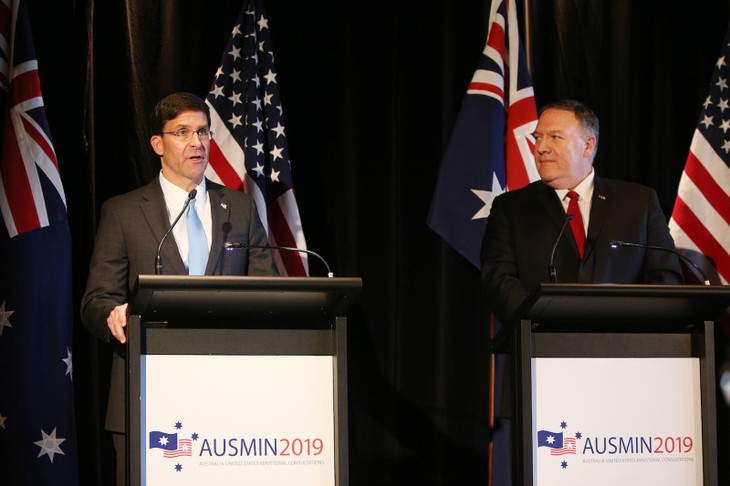(VOVWORLD) - Newly confirmed US Secretary of Defense Mark Esper has made a 6-day trip to 5 Asia-Pacific countries. His first international tour just a few days after taking office showed the importance of Asia-Pacific to US foreign policy and the Pentagon’s priorities.
 U.S. Defense Secretary Mark Esper and US Secretary of State Mike Pompeo speak during a press conference at the Parliament of New South Wales in Sydney on Aug. 4. (photo: LISA MAREE WILLIAMS/GETTY IMAGES) U.S. Defense Secretary Mark Esper and US Secretary of State Mike Pompeo speak during a press conference at the Parliament of New South Wales in Sydney on Aug. 4. (photo: LISA MAREE WILLIAMS/GETTY IMAGES) |
The Secretary paid visits to Australia, New Zealand, Japan, South Korea, and Mongolia. Including Mongolia with the 4 US allies caught public attention by revealing a new priority for the Pentagon.
Cooperation commitments from allies
Choosing Australia as the first stop, the US conveyed its wish to tighten security-defense relations with Australia. At the annual Australia-US Ministerial Consultations in Canberra, both sides agreed on an approach to maritime issues and a commitment to security, stability, and prosperity in the region.
Australia said it would seriously consider the US’s invitation to take part in Operation Sentinel in the Middle East, but made no commitment. Australia also didn’t respond to the US plan to deploy a missile defense battery in Asia.
In New Zealand, Esper confirmed that the Indo-Pacific is a priority for both countries’ defense strategies. Speaking highly of cooperation in regional security, the defense ministers pledged to tighten their partnership in implementing strategies in the Indo-Pacific region.
Esper’s visits to Japan and South Korea illustrated Washington’s wish to foster trilateral ties. In a meeting with Japanese Defense Minister Takeshi Iwaya, both sides agreed to work together on denuclearizing the Korean peninsula and confirmed the importance of Japanese-US-South Korean cooperation in that process. Meeting with South Korean Defense Minister Jeong Kyeong-doo, Esper spoke highly of the strong US-South Korean alliance, which is the key to ensuring peace and security on the Korean peninsula and in northeast Asia.
Esper failed to persuade Japan to join the international maritime coalition in the Strait of Hormuz.
Mongolia: a shift in the US’s policy
The world paid close attention to Esper’s visit to Mongolia, which took place not long after Mongolian President Battulga Khamtmaa’s meeting with President Donald Trump in Washington in July. Before that US National Security Advisor John Bolton also visited Mongolia.
Mongolian has been a consistent military partner of the US, supporting US military operations in Iraq and Afghanistan. Ulaanbaatar has a good relationship with Pyongyang, which could benefit the US if Trump decides to resume nuclear talks.
Analysts say that the US Defense Secretary’s visit to Mongolia has many meanings, as it is a country situated between Russia and China, both considered to be threats to US national security. The visit has laid a foundation for the US-Mongolia cooperation in politics, economics, and defense.
The visits to 5 Asia-Pacific countries aimed to foster the US’s relations with its allies and underline its presence and role in the region.